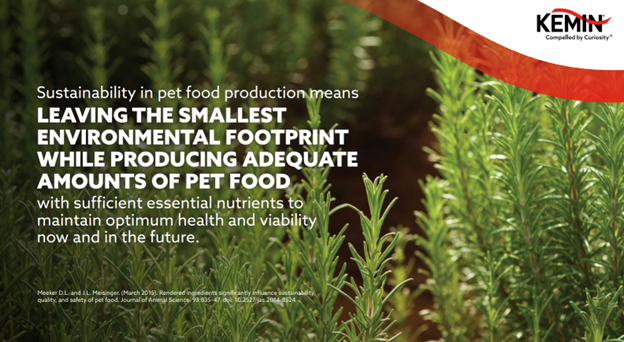
With pet health and nutrition at the forefront of pet parents minds, pet food manufacturers and ingredient suppliers must continue to put sustainability at the forefront of their innovations.
Brand Insights from Kemin
Over the past few years, sustainability in the pet food industry has developed from trend into mainstream messaging and action. Despite recent supply chain challenges and high inflation, sustainability concerns for consumer goods continue to grow, especially in the pet care market1. As a result, the pet food industry has an opportunity to incorporate more sustainable solutions to serve pet parents.
What Makes a Sustainable Pet Food Product?
When discussing sustainability, we consider a range of environmental, social, and economic issues. The goal is to meet the needs of the present without limiting the ability of future generations to meet their own needs. While there is no all-encompassing definition of a sustainable ingredient or practice, we can use the table below to guide our decisions.

From using sustainable ingredients and smarter packing to conserving resources, it is becoming more prevalent to source pet food ingredients using sustainable methods to ensure there is minimal negative impact on ecological, environmental, or human wellbeing. There are multiple ways you can be committed to reducing your impact on the environment and helping your customers do so as well.

Sustainable Ingredient Solutions
A commonly unrecognized source of sustainable ingredients for pet food are rendered products, valuable fats and proteins recycled from raw materials that would otherwise be sent to landfills. Alternative protein sources, like insect protein, can reduce dependency on proteins used in the human food supply. Sustainability-driven macro-ingredient selection is not the only way to improve pet food sustainability; plant-based ingredients, such as natural antioxidants, can also contribute to overall pet food sustainability goals. Botanical extracts have an incredibly bright future as a source of natural ingredients that can provide antioxidant activity. Beyond efficacy, botanical extracts can present opportunities to find value in sustainable agriculture, as well as creating a diversified pool of natural alternatives to tocopherols.

As one of the most vertically integrated suppliers of plant-based ingredients, Kemin has recognized the importance of sustainable agriculture of botanical ingredients for decades. Across the supply chain, Kemin controls the breeding, plant selection, growing, harvesting and extraction of our specialty crops. Kemin’s rosemary and spearmint crops maintain Sustainably Grown certification – Certified Sustainably Grown by SCS Global recognizes businesses that meet the world's most stringent operational standards and are actively committed to driving positive change in environmental and social sustainability. These crops are integrated into the production of Kemin’s natural antioxidants .

With pet health and nutrition at the forefront of pet parents minds, pet food manufacturers and ingredient suppliers must continue to put sustainability at the forefront of their innovations. A company’s commitment to sustainability is critical to healthy people, a healthy planet, and a healthy environment for future generations. As a provider of key ingredients for humans, animals, pets, and plants, Kemin believes in an ongoing commitment to sustainability, from partnering with climate action consultants to assess the carbon footprint of our products to collecting data on our CO2 emissions and energy and water usage from our global manufacturing facilities, Kemin is continuously to working to address climate change. We recognize our responsibility to reduce our carbon footprint and safeguard natural resources to transform today into a better tomorrow. Curious about sustainability at Kemin – read more here!
1 NielsenIQ Report – 2023 Pet Trends for Pet Frood and Pet Supply Brands. 10 March 2023.
